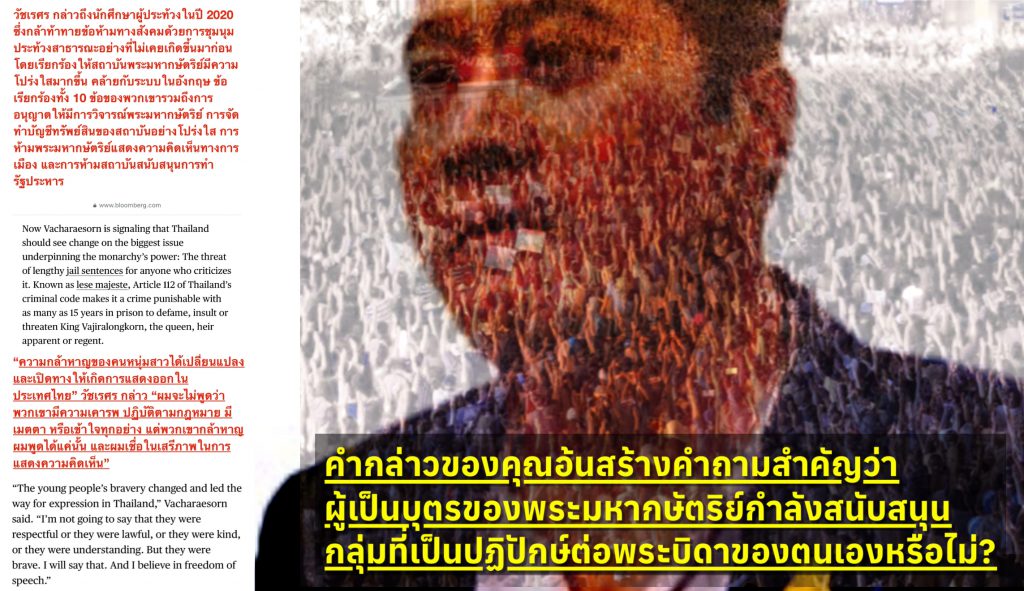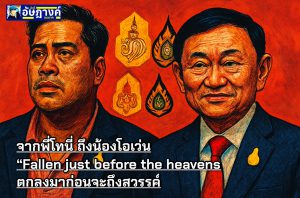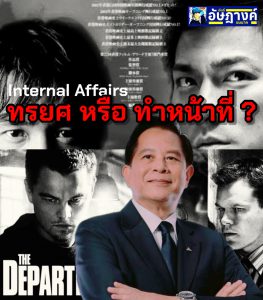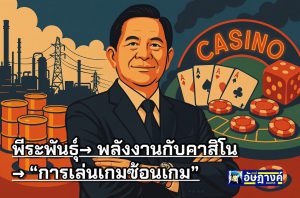
ข้อถกเถียงเกี่ยวกับบทบาทของวัชเรศร วิวัชรวงศ์ กับจุดยืนต่อสถาบันพระมหากษัตริย์
วัชเรศร วิวัชรวงศ์: จากบุตรสู่แนวร่วมกลุ่มปฏิปักษ์ต่อสถาบันพระมหากษัตริย์หรือไม่?
ประชาชนไทยส่วนใหญ่เชื่อว่าบุตรของพระมหากษัตริย์ควรมีความจงรักภักดีต่อสถาบันและพระบิดาของตน ทว่า วัชเรศร วิวัชรวงศ์ กลับสร้างความตกตะลึงด้วยการแสดงท่าทีสนับสนุนกลุ่มที่มีแนวคิดเป็นปฏิปักษ์ต่อสถาบันพระมหากษัตริย์
ในการให้สัมภาษณ์กับสำนักข่าว Bloomberg วัชเรศรกล่าวชื่นชมขบวนการเคลื่อนไหวปี 2563 ที่มีข้อเรียกร้องให้ปฏิรูปสถาบัน รวมถึงการแก้ไขมาตรา 112 ซึ่งศาลรัฐธรรมนูญวินิจฉัยว่าเป็น แนวทางที่นำไปสู่การล้มล้างการปกครอง คำกล่าวของเขาสร้างคำถามสำคัญว่า ผู้เป็นบุตรของพระมหากษัตริย์กำลังสนับสนุนกลุ่มที่เป็นปฏิปักษ์ต่อพระบิดาราชของตนเองหรือไม่?
สถาบันพระมหากษัตริย์ไทยเป็นเสาหลักของชาติที่ดำรงอยู่เคียงข้างสังคมไทยมาอย่างยาวนาน โดยมีบทบาทสำคัญทั้งในแง่ของความเป็นศูนย์รวมจิตใจของประชาชนและการรักษาเสถียรภาพของประเทศ ตลอดประวัติศาสตร์ไทย พระโอรส พระธิดาและบุตรของพระมหากษัตริย์ทรงได้รับการคาดหวังให้มีความจงรักภักดีต่อสถาบันที่พระบิดาทรงเป็นองค์ประมุข
อย่างไรก็ตาม กรณีของนายวัชเรศร วิวัชรวงศ์ ได้สร้างข้อถกเถียงในสังคมไทย เนื่องจากแม้ว่าเขาจะเป็นบุตรของ พระบาทสมเด็จพระเจ้าอยู่หัว รัชกาลที่ 10 แต่ถ้อยแถลงและจุดยืนของเขากลับสะท้อนถึงการสนับสนุนแนวคิดที่มีลักษณะเป็นปฏิปักษ์ต่อสถาบันพระมหากษัตริย์หรือไม่ ซึ่งเป็นประเด็นที่สร้างความตกตะลึงและความผิดหวังให้กับประชาชนจำนวนมาก
วัชเรศร วิวัชรวงศ์: จากบุตรสู่บุคคลที่มีแนวคิดสวนทางกับสถาบันพระมหากษัตริย์!
นายวัชเรศร ซึ่งใช้ชีวิตอยู่ต่างประเทศมาเป็นเวลานาน ได้รับความสนใจจากสื่อมวลชนหลังจากให้สัมภาษณ์กับสำนักข่าว Bloomberg ซึ่งในบทสัมภาษณ์ดังกล่าว เขาได้แสดงความคิดเห็นเกี่ยวกับ มาตรา 112 แห่งประมวลกฎหมายอาญาไทย หรือกฎหมายหมิ่นพระบรมเดชานุภาพ โดยกล่าวว่า
“ผมเชื่อในเสรีภาพในการแสดงความคิดเห็น”
ถ้อยคำนี้โดยทั่วไปอาจถูกตีความว่าเป็นการสนับสนุนสิทธิเสรีภาพ แต่เมื่อพิจารณาจากบริบทของผู้ที่เคลื่อนไหวต่อต้านมาตรา 112 คำพูดดังกล่าวสะท้อนถึงการส่งเสริมแนวคิดที่ตรงกับฝ่ายที่ต้องการ ปฏิรูปหรือลดทอนอำนาจของสถาบันพระมหากษัตริย์ ซึ่งเป็นประเด็นที่อ่อนไหวอย่างยิ่งในสังคมไทย
นอกจากนี้ วัชเรศรยังกล่าวถึง กลุ่มนักศึกษาที่เคลื่อนไหวเมื่อปี 2563 ซึ่งเป็นกลุ่มที่มีข้อเรียกร้องเกี่ยวกับการปฏิรูปสถาบันพระมหากษัตริย์ โดยเขากล่าวว่า
“ความกล้าหาญของคนหนุ่มสาวได้เปลี่ยนแปลงและเปิดทางให้เกิดการแสดงออกในประเทศไทย”
ความคิดเห็นดังกล่าวสอดคล้องกับแนวคิดของกลุ่มเคลื่อนไหวทางการเมือง โดยเฉพาะกลุ่มผู้ประท้วงในปี 2563 ซึ่งเรียกร้องให้ปฏิรูปสถาบันพระมหากษัตริย์ ได้แก่
• การอนุญาตให้มีการวิพากษ์วิจารณ์สถาบันพระมหากษัตริย์
• การเปิดเผยบัญชีทรัพย์สินของสถาบันให้โปร่งใส
• การจำกัดบทบาทของสถาบันในทางการเมือง
• การห้ามไม่ให้สถาบันพระมหากษัตริย์สนับสนุนการรัฐประหาร
กลุ่มผู้ชุมนุมเหล่านี้เป็นกลุ่มเดียวกับที่มีข้อเสนอ 10 ข้อ ซึ่งรวมถึงการแก้ไขกฎหมายมาตรา 112 และข้อเรียกร้องที่พุ่งเป้าไปที่การลดบทบาทของสถาบันพระมหากษัตริย์ในทางการเมือง การเงิน และการทหาร คำกล่าวของวัชเรศรที่ยกย่องการเคลื่อนไหวเหล่านี้จึงถูกตีความว่าเป็นการ สนับสนุนแนวคิดของกลุ่มที่มีท่าทีเป็นปฏิปักษ์ต่อสถาบันพระมหากษัตริย์
ขัดแย้งกับบทบาทของบุตรที่พึงมี
การที่วัชเรศรสนับสนุนแนวคิดของกลุ่มเคลื่อนไหวดังกล่าว ทำให้ประชาชนจำนวนมากตั้งคำถามว่า เหตุใดบุตรของพระมหากษัตริย์จึงไม่รักษาจุดยืนที่สอดคล้องกับสถาบันที่พระราชบิดาของเขาทรงเป็นองค์ประมุข? ในขณะที่สังคมไทยคาดหวังว่าบุตรของพระเจ้าอยู่หัวจะทรงมีความจงรักภักดีต่อพระมหากษัตริย์และสถาบัน แต่สิ่งที่วัชเรศรกล่าวออกมา กลับขัดแย้งกับบทบาทที่พึงมีของเชื้อพระวงศ์
การแสดงความคิดเห็นในลักษณะดังกล่าวไม่เพียงแต่ สร้างความผิดหวังให้กับประชาชนที่เทิดทูนสถาบัน แต่ยังส่งผลต่อภาพลักษณ์ของสถาบันพระมหากษัตริย์ในระดับสากล เพราะถูกใช้เป็นเครื่องมือในการโจมตีสถาบันโดยกลุ่มที่ต้องการลดบทบาทของพระมหากษัตริย์ในประเทศไทย
มาตรา 112: กลไกที่จำเป็นต่อเสถียรภาพของชาติ
มาตรา 112 แห่งประมวลกฎหมายอาญาไทย หรือ กฎหมายหมิ่นพระบรมเดชานุภาพ เป็นกฎหมายที่มีขึ้นเพื่อปกป้องสถาบันพระมหากษัตริย์จากการโจมตีที่อาจนำไปสู่ ความแตกแยกและความไม่มั่นคงของชาติ กฎหมายนี้ไม่ได้มีขึ้นเพื่อปิดกั้นเสรีภาพในการแสดงความคิดเห็นโดยทั่วไป แต่เพื่อป้องกันการกระทำที่มีเจตนาบ่อนทำลายเสถียรภาพของสถาบัน
สถาบันพระมหากษัตริย์ไทยเป็นรากฐานสำคัญของอัตลักษณ์ วัฒนธรรม และการปกครองของชาติไทยมาอย่างยาวนาน มาตรา 112 ของประมวลกฎหมายอาญาไทย หรือที่เรียกว่ากฎหมายหมิ่นพระบรมเดชานุภาพ มีไว้เพื่อปกป้องและรักษาเกียรติของสถาบันพระมหากษัตริย์ เช่นเดียวกับที่ประเทศอื่น ๆ มีกฎหมายคุ้มครองประมุขของตน ไม่ว่าจะเป็นกษัตริย์ ราชินี หรือประธานาธิบดี
กฎหมายหมิ่นพระบรมเดชานุภาพในลักษณะนี้มีอยู่ในหลายประเทศทั่วโลก หลายประเทศมีกฎหมายที่ปกป้องประมุขและสถาบันของตนจากการหมิ่นประมาทและการโจมตีที่อาจเป็นภัยต่อความมั่นคงของชาติ
หากมีบุคคลในสหรัฐอเมริกา สหราชอาณาจักร หรือประเทศในสหภาพยุโรปกระทำการที่บ่อนทำลายหรือเป็นภัยต่อประมุขของตนเอง จะมีองค์การสหประชาติ สหรัฐอเมริกา หรือวัชเรศร ออกมาเรียกร้องในประเด็น “เสรีภาพในการแสดงความคิดเห็น” ให้ประเทศเหล่านั้นยกเลิกกฎหมายที่คุ้มครองประมุขของตนหรือไม่?
หรือประเทศไทยกำลังถูกเลือกปฏิบัติเนื่องจากการขาดความเข้าใจหรือการละเลยบริบททางประวัติศาสตร์และวัฒนธรรมของเรา?
ในประเทศไทย ผู้ที่ถูกดำเนินคดีตามมาตรา 112 ไม่ใช่เพียงนักวิจารณ์ธรรมดา แต่หลายครั้งเป็นกลุ่มบุคคลที่มีจุดยืนชัดเจนในการต่อต้านสถาบันพระมหากษัตริย์ และโดยนัยแล้วก็คือการต่อต้านระบบประชาธิปไตยอันมีพระมหากษัตริย์เป็นประมุขของไทย การกระทำของพวกเขามิใช่เพียงเสรีภาพในการแสดงความคิดเห็น แต่เป็นการพยายามทำลายรากฐานที่สำคัญของสังคมไทย
นอกจากนี้ ศาลรัฐธรรมนูญของไทยได้มีคำวินิจฉัยชัดเจนแล้วว่า การยกเลิกมาตรา 112 ถือเป็นการดำเนินการไปสู่การล้มล้างการปกครอง ดังนั้น ผู้ที่รณรงค์ให้มีการยกเลิกกฎหมายดังกล่าวย่อมถูกพิจารณาว่าเป็นการดำเนินการไปสู่การล้มล้างการปกครองโดยปริยาย นี่คือข้อเท็จจริงทางกฎหมายที่ไม่อาจละเลยหรือเพิกเฉยได้
บทสรุป: วัชเรศร กับท่าทีที่สวนทางกับความคาดหวังของประชาชน
กรณีของ วัชเรศร วิวัชรวงศ์ สะท้อนถึงความขัดแย้งในเชิงบทบาทของบุตรในสถาบันพระมหากษัตริย์ แม้ว่าโดยสายเลือดแล้วเขาควรมีความจงรักภักดีต่อพระมหากษัตริย์และสถาบัน แต่คำพูดและจุดยืนของเขากลับสะท้อนถึงการสนับสนุนแนวคิดของกลุ่มที่เป็นปฏิปักษ์ต่อสถาบัน ซึ่งทำให้ประชาชนเกิดข้อกังขาต่อเจตนาที่แท้จริงของเขา
ในขณะที่ประเทศไทยยังคงเผชิญกับความท้าทายทางการเมืองและความพยายามบ่อนทำลายสถาบัน การรักษาเสถียรภาพของชาติและสถาบันพระมหากษัตริย์เป็นสิ่งที่สำคัญยิ่ง บทบาทของเชื้อพระวงศ์ควรเป็นไปในทิศทางที่เสริมสร้างความมั่นคงของชาติ ไม่ใช่เป็นไปในลักษณะที่ทำให้เกิดความแตกแยกหรือส่งเสริมแนวคิดที่เป็นภัยต่อสถาบัน
ประชาชนไทยต้องพิจารณาถึงข้อเท็จจริงเหล่านี้ด้วยวิจารณญาณ และไม่ควรหลงเชื่อคำกล่าวของผู้ที่มีแนวคิดเป็นปฏิปักษ์ต่อสถาบันโดยไม่วิเคราะห์อย่างรอบด้าน เพราะในท้ายที่สุด สถาบันพระมหากษัตริย์ไทยเป็นเสาหลักของชาติที่ต้องได้รับการปกป้องเพื่อความมั่นคงของประเทศและประชาชนทุกคน
The Controversy Surrounding Vacharaesorn Vivacharawongse and His Stance on the Thai Monarchy
Vacharaesorn Vivacharawongse: From Royal Heir to Ally of Anti-Monarchy Groups?
The Thai public widely believes that the son of the King should remain loyal to the monarchy and his father. However, Vacharaesorn Vivacharawongse has shocked many by expressing views that align with groups that are actively opposed to the Thai monarchy.
In his interview with Bloomberg, Vacharaesorn praised the 2020 protest movement, which advocated for monarchy reform and the amendment of Article 112—the lèse-majesté law, which the Constitutional Court has ruled as an attempt to overthrow the government. His statements have raised a crucial question: Is the son of the King supporting those who are against his own father?
The Thai Monarchy: A Pillar of Stability and National Identity
The Thai monarchy has long served as a cornerstone of national unity and stability, acting as both a symbol of national identity and a guardian of political stability. Throughout history, the King’s sons and daughters have been expected to uphold unwavering loyalty to the institution led by their father, the reigning monarch.
However, Vacharaesorn’s case has sparked widespread debate as he is the son of King Rama X, yet his statements appear to align with ideas that challenge the authority of the monarchy. This has shocked and disappointed many Thais, raising concerns about his real intentions and ideological leanings.
Vacharaesorn’s Public Endorsement of Anti-Monarchy Sentiments
Having lived abroad for many years, Vacharaesorn recently attracted media attention after making remarks on Thailand’s lèse-majesté law (Article 112) during his interview with Bloomberg. He stated:
“I believe in freedom of speech.”
At face value, this statement may seem like a general endorsement of civil liberties. However, when viewed in the context of those actively campaigning to abolish Article 112, it reflects a position that directly aligns with groups seeking to reform or weaken the monarchy’s authority—a highly sensitive issue in Thai society.
Moreover, he openly praised the 2020 student-led protest movement, which explicitly called for monarchy reform. He stated:
“The bravery of young people has changed and paved the way for expression in Thailand.”
These protests put forward 10 demands, including:
• Allowing open criticism of the monarchy
• Requiring full transparency in royal assets
• Restricting the monarchy’s involvement in politics
• Banning royal endorsement of military coups
The same movement has called for amendments to Article 112, raising concerns that Vacharaesorn’s endorsement might be seen as supporting groups with openly anti-monarchy objectives.
A Contradiction to the Expected Role of a Royal Heir
Vacharaesorn’s support for these movements has led many to question why he is not aligning with the principles of the monarchy led by his father. While the Thai public expects members of the royal family to uphold loyalty to the monarchy, Vacharaesorn’s remarks conflict with the traditional role of royal heirs.
His statements have not only disappointed royalists but also affected the image of the Thai monarchy internationally, as his words are now being used by anti-monarchy groups as ammunition to challenge the institution.
Article 112: A Necessary Law for National Stability
Article 112 of the Thai Criminal Code (lèse-majesté law) exists to protect the monarchy from defamation and destabilization efforts that could lead to national division. The law does not exist to suppress free speech but rather to preserve national stability and security by preventing malicious attacks on the monarchy.
The Thai Constitutional Court has ruled that any attempt to repeal Article 112 is an act leading toward the overthrow of the government. Therefore, those who support its abolition or align with movements advocating for its repeal are effectively working toward destabilizing the monarchy and the political system it upholds.
The Thai Monarchy: A Foundational Institution That Must Be Protected
The Thai monarchy has long been the foundation of Thai culture, national identity, and governance. Like many nations around the world, Thailand upholds legal protections for its head of state—just as countries like the UK, Spain, and Japan do. These laws are crucial for maintaining national security and ensuring that no institution is unjustly targeted for political purposes.
Would the United Nations or Western nations advocate for the repeal of similar laws in the United States, the UK, or EU member states if their heads of state were under attack? Or is Thailand being selectively targeted due to a misunderstanding or disregard of its historical and cultural context?
In Thailand, those prosecuted under Article 112 are not merely ordinary critics—many have explicitly expressed hostility toward the monarchy and, by extension, the constitutional monarchy system. Their actions do not solely fall under free speech but rather constitute deliberate attempts to weaken or dismantle the monarchy’s role in Thailand.
Final Thoughts: Vacharaesorn’s Position and the Future of the Monarchy
The case of Vacharaesorn Vivacharawongse raises fundamental questions about his loyalty to the monarchy and his alignment with groups that oppose the institution his father leads. While he may not have openly called for monarchy reform, his statements have given credibility to groups that seek to diminish or dismantle the monarchy’s authority.
At a time when Thailand faces political challenges and external pressures, the role of the monarchy remains critical to national stability. Members of the royal family should contribute to strengthening the institution, rather than fueling narratives that could weaken it.
The Thai people must critically evaluate these developments and remain vigilant against attempts to erode the monarchy’s legitimacy. Ultimately, the monarchy is a national pillar that must be protected—not just for the sake of tradition, but for the long-term stability and unity of Thailand.



